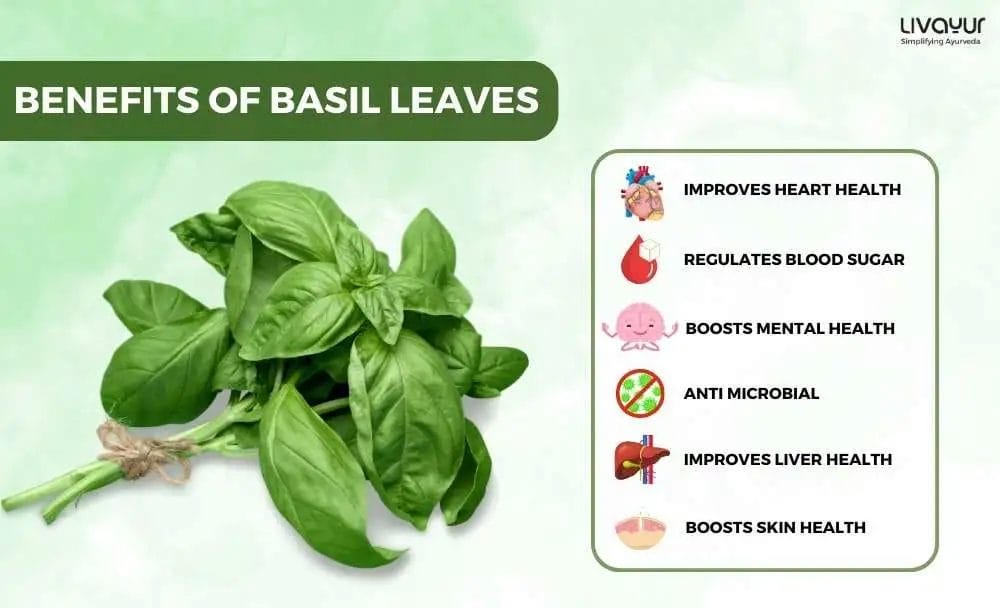
Basil is a leafy herb with highly aromatic leaves. This herbaceous plant belongs to the mint family and is native to Asia and Africa.. Basil was called ‘The Herb of Kings’ in ancient Greece. The Greeks believed that the king alone could harvest this herb with a golden sickle. [1] The word ‘Basil’ was coined after the Greek word ‘basilikhon,’ meaning ‘royal. ‘
There are nearly 60 varieties of basil herb, such as lemon basil, sweet basil, curly basil, and holy basil, among others.
In Ayurveda, this herb is considered extremely beneficial for its many therapeutic properties. Ayurveda focuses mainly on the Holy Basil variety, which is called Tulsi in the indigenous system of medicine. This herb has been glorified in almost every Ayurvedic text due to its innumerable health benefits. The Ayurvedic properties of Holy Basil include [3]:
- Taste: Tikta or bitter
- Potency: Ushna or hot
- Quality: Laghu or light
- Effect: Ruksha or dry
Traditional use of the basil herb in India encompasses its utility as a rejuvenating tonic with remarkable vitalizing properties. The use of the herb is believed to give one longevity and a healthy life. [2].
The leaves of the herb are packed with nutrients like vitamin A, vitamin K, iron, manganese, and calcium. Its rich nutritional profile makes it a powerful natural remedy for several human ailments. In this article, we’ll focus on the benefits of basil leaves, the uses of basil leaves, the potential side effects, and more. Read on:
Nutritional value of basil [4]
The health benefits of basil leaves are due to their rich nutritional profile. The table below shows the various nutrients in basil and their values.
| Nutrients | Values |
| Energy | 23 kcal |
| Carbohydrates | 2.65g |
| Fat | 0.64g |
| Fiber | 1.6g |
| Proteins | 3.15g |
| Ash | 1.49g |
| Sugar | 0.3g |
| Calcium | 177mg |
| Potassium | 295mg |
| Magnesium | 64mg |
| Sodium | 4mg |
| Phosphorus | 56mg |
| Manganese | 1.15mg |
| Iron | 3. 17mg |
| Copper | 0.385mg |
| Zinc | 0.81mg |
| Selenium | 0.3µg |
| Folate | 68µg |
| Vitamin C | 18mg |
| Vitamin A | 264µg |
| Vitamin E | 0.8mg |
| Beta carotene | 3140µg |
| Riboflavin | 0.076mg |
| Niacin | 0.902mg |
| Thiamine | 0.034mg |
Basil leaves benefits for health
1. Boosts digestion
Basil leaves, especially Tulsi, are one of the best natural remedies to improve digestion and treat several gastrointestinal problems, such as bloating, indigestion, acid reflux, peptic ulcers, etc. [3] [5]
2. Fights oxidative stress
Rich in antioxidants, basil leaves help eliminate free radicals from the body and fight oxidative stress that can cause many diseases such as diabetes, high blood pressure, etc. [5]
3. Lowers inflammation
Powered with anti-inflammatory properties, basil leaves help reduce inflammation and prevent inflammatory diseases, such as rheumatoid arthritis, heart diseases, inflammatory bowel conditions, etc. [5]
4. Treats skin disorders
There are many benefits of basil leaves for the skin. Blessed with anti-inflammatory, antioxidant, and antimicrobial properties, basil leaves help to fight free radical damage, eliminate harmful toxins, and prevent infections in the skin. Therefore, they are widely used to cure many skin disorders, prevent skin aging, and boost overall skin health. [5]
5. Improves liver health
Tulsi, or holy basil, is known to remove harmful toxins from the body and prevent fat build-up in the liver, thereby promoting liver functions. It is also highly effective in preventing and curing several liver diseases. [3]
6. Protects against infections
Basil leaves are blessed with potent antimicrobial properties that help prevent and fight infections such as cough, cold, flu, skin infections, respiratory infections, eye infections, etc. [3]
7. Regulates blood sugar levels
Basil leaves are highly effective in lowering high blood sugar levels and preventing the risk factors of diabetes, such as high cholesterol, hypertension, etc. In addition, they also have a low glycemic load, which makes them a healthy choice for diabetes patients. [3]
8. Boosts mental health
Tulsi, or holy basil, is one of the best Ayurvedic herbs to reduce stress, anxiety, insomnia, etc. It is also known as an effective remedy to treat depression. [5]
9. Reduces the risk of cancer
According to Ayurveda, Tulsi or holy basil is highly rich in antioxidants and helps prevent many types of cancers, such as liver cancer, skin cancer, lung cancer, etc. [6]
10. Treats cardiovascular diseases
Basil leaves are highly beneficial in improving heart health. They help lower cholesterol and triglyceride levels and regulate blood pressure levels in the body, thereby preventing and fighting many heart diseases. [5]
Basil leaves uses
1. As a therapeutic herb
In Ayurveda, basil is considered a magical panacea for a wide range of human ailments. It is used as a tonic or a medication for health issues such as bacterial and fungal skin infections, viral encephalitis, malaria, asthma, respiratory congestion, sinusitis, ulcers, painful joints, diabetes, typhoid, and many more. To reap the health benefits of basil leaves, you may consume the leaves in various ways. You may simply chew the raw leaves of basil, add it to your soups and salads, flavor your smoothies and lemonades with basil, take it as a health supplement, or drink it as basil tea. [5]
2. As a natural emollient/ointment
One of the basil leaves uses include its application as a natural ointment or an emollient balm. Applying a paste of basil leaves to the skin can remedy skin issues like eczema, rashes, prickly heat, mosquito bites, etc. Also, the paste of basil leaves, if applied to an inflamed, aching joint, can relieve the pain and discomfort.
3. As a beverage
Dried basil leaves steeped in hot water can give you delicious basil tea, which is not just a beverage but a therapeutic drink used to treat a host of human ailments. The basil leaves may also be used to prepare other types of beverages, such as basil lemonade, basil cocktails, etc.
4. As a culinary herb
This herb may be used to flavor your dishes. It is widely used in Italian, Thai, and Vietnamese cuisine to garnish pasta, stews, soups, salads, etc. Both freshly chopped basil leaves and dried basil leaves may be used in cooking. The sweet basil variety is mostly used as a culinary herb. [5]
5. As a pooja samagri (ingredient)
In India, the holy basil or Tulsi is used to worship gods and goddesses. It holds much religious significance, and it’s considered sacred. The holy basil is revered as a synonym of Lord Krishna in Hindu Indian households. In every religious ceremony or poojas, the holy basil is absolutely indispensable. [3]
6. As an essential oil
The essential oil of the basil herb is highly useful in relieving anxiety and stress, relaxing tight muscles, and treating aching joints and skin diseases.
Side effects of basil
The basil herb is safe for consumption if taken in permissible dosage. However, excessive consumption of the herb may lead to certain side effects in some individuals.
1. Complicates bleeding disorders
Overconsumption of this herb may complicate bleeding disorders. As basil slows down blood clotting, people with bleeding disorders may experience worsening symptoms.
2. Sudden drop in blood pressure
Basil exhibits a very strong anti-hypertensive effect. Therefore, this herb may be unsuitable for people who have low blood pressure. Consumption of this herb may lower blood pressure even more, leading to complications.
3. Heightens the risk of liver cancer
Basil contains a chemical compound called estragole, which may increase the risk of liver cancer in some people. [7]
Precautions to consider
Whether basil is safe for children, pregnant women, breastfeeding mothers, and aged people is not known clearly. There is limited information available on this subject. Therefore, it is best to consult a doctor before giving this herb to the groups mentioned above.
Interaction with other drugs
Since basil significantly lowers blood pressure and glucose, it can interact with blood pressure and blood-sugar-lowering medications, leading to a sharp drop. Sudden drastic falls in blood pressure and sugar levels may lead to fatal health complications. Furthermore, basil is unsuitable for consumption alongside blood thinners like aspirin, heparin, enoxaparin, etc.
Please note: There is limited scientific research regarding the side effects, precautions, and drug interactions associated with the herb basil. Therefore, you must consult a healthcare expert before using the herb.
FAQs
1. Which type of basil herb is recommended in Ayurveda?
Ayurveda recommends the use of the Holy Basil for treating human diseases.
2. How to make basil or Tulsi tea at home?
To make Tulsi or Holy Basil tea at home, boil a few Tulsi leaves in water for 5 minutes and then strain it. You can also add honey or lemon to the tea as per your taste.
3. What is the ‘Karma’ of Holy Basil according to Ayurveda?
Holy Basil exhibits the following karmas (actions) [3]:
• Pittahara
• Kaphahara
• Dahakara
• Hardya
• Vranashodhaka
• Karmighna
4. Are basil and pudina the same?
No, they are two different herbs. They come in distinct flavors. Mint has a mildly sweet flavor and refreshing taste, while basil is a more savory herb with hints of pepper and clove.
5. What is the utility of basil oil?
Aromatherapy attaches much importance to the essential oil extracted from sweet basil. This oil has the capacity to stimulate, fortify, calm, energize and clarify. The invigorating power of basil oil can uplift your mood and mind and even relieve respiratory and digestive discomforts.
Conclusion
The pharmacological or medicinal properties of basil make it a much-revered herb worldwide. Basil is considered a healing balm for the body, mind, and spirit. In the classical literature, the Holy Basil variety of the basil herb is categorized as an antipyretic, automatic, and stimulant. With the proper use of this herb, several human ailments, such as respiratory issues, ulcers, pain and inflammation, infections, etc, may be treated effectively. In this article, we have discussed the various benefits of basil leaves for health. So, start using the basil herb for improved health and well-being.
Disclaimer
This article has been written from a health and wellness perspective. It is not a substitute for medical advice.
References
- Basil, Ocimum basilicum
- Sacred basil – an Ayurvedic adaptogen
- Tulsi (Ocimum Sanctum Linn.): AN AYURVEDIC AND CONTEMPORARY REVIEW
- Basil, Fresh
- Basil: A natural source of antioxidants and neutraceuticals
- In Vitro and In Vivo Anticancer Activity of Basil (Ocimum spp.): Current Insights and Future Prospects
- EVIDENCE OF THE CARCINOGENECITY OF ESTRAGOLE


















